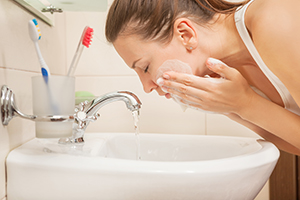Treating Rosacea
Treating Rosacea

Your healthcare provider may prescribe 1 or more treatments to put on your skin each day. You may also be given medicines to take by mouth if you have more severe rosacea symptoms. To relieve rosacea eye symptoms, you may need prescription eye drops. Avoid things that can easily cause your rosacea to flare up. These include spicy foods, alcohol, getting embarrassed, and going from a cold environment to a warm environment. You may have surgery to fix the more severe forms of scarring rosacea of the nose. This is called rhinophyma and means the redness and swelling that cause the nose to enlarge.
Your role in medical treatment
How well your treatment works depends partly on you. Follow your healthcare provider’s treatment plan. Rosacea symptoms often get better with medicines. But they tend to get worse again if you stop taking the medicines. If your symptoms continue or get worse, ask about other treatment options, including combinations of treatments.
Rosacea self-care
Besides sticking with your treatment plan, follow these tips to care for your skin:
Wash your face twice a day with a gentle facial cleanser. Rinse your skin well with warm (not hot) water. Pat your skin dry with a cotton towel.
Don’t scrub your skin or use sponges, brushes, or other abrasive tools. Doing so can irritate your skin.
Avoid harsh scrubs or astringents. These products can irritate your skin.
If you shave your face, use an electric razor.
Apply sunscreen with at least SPF 15 or more every day. Sun exposure can make rosacea symptoms worse.
Choose skin care products and cosmetics that do not irritate the skin, and are oil-free and fragrance-free.
Avoid putting steroids on the skin sores. Steroids may make rosacea worse.
Getting good results
Learning about rosacea and treating it early is the first step toward controlling this disease. With proper treatment and self-care, you can manage your symptoms and feel better about your skin. The National Rosacea Society is a great resource for information.
What causes rosacea flare-ups?
It’s often hard to pinpoint the factors that cause rosacea flare-ups. Different people can be affected by different triggers. Common triggers include weather extremes, sun exposure, alcoholic or hot beverages, spicy food, physical exertion, stress, illness, some skin products, and medicines. To prevent flare-ups, keep a list of things that seem to make your rosacea worse. Then try to avoid them.
Updated:
February 14, 2018
Reviewed By:
Image reviewed by StayWell art team.,Lehrer, Michael Stephen, MD,Sather, Rita, RN